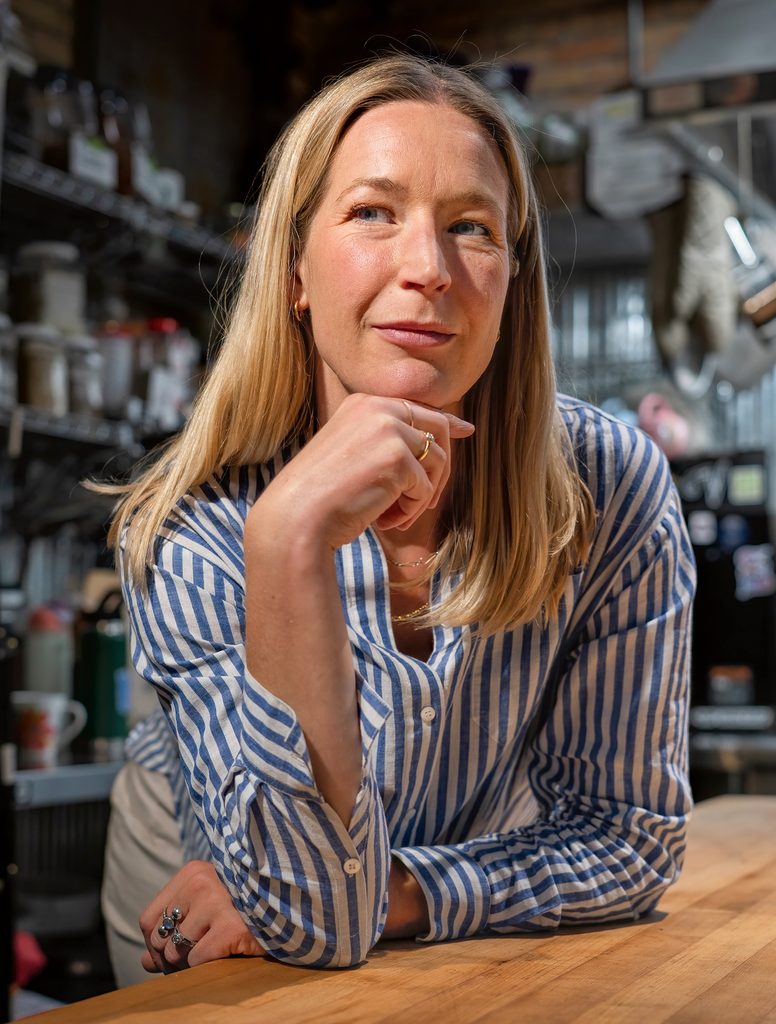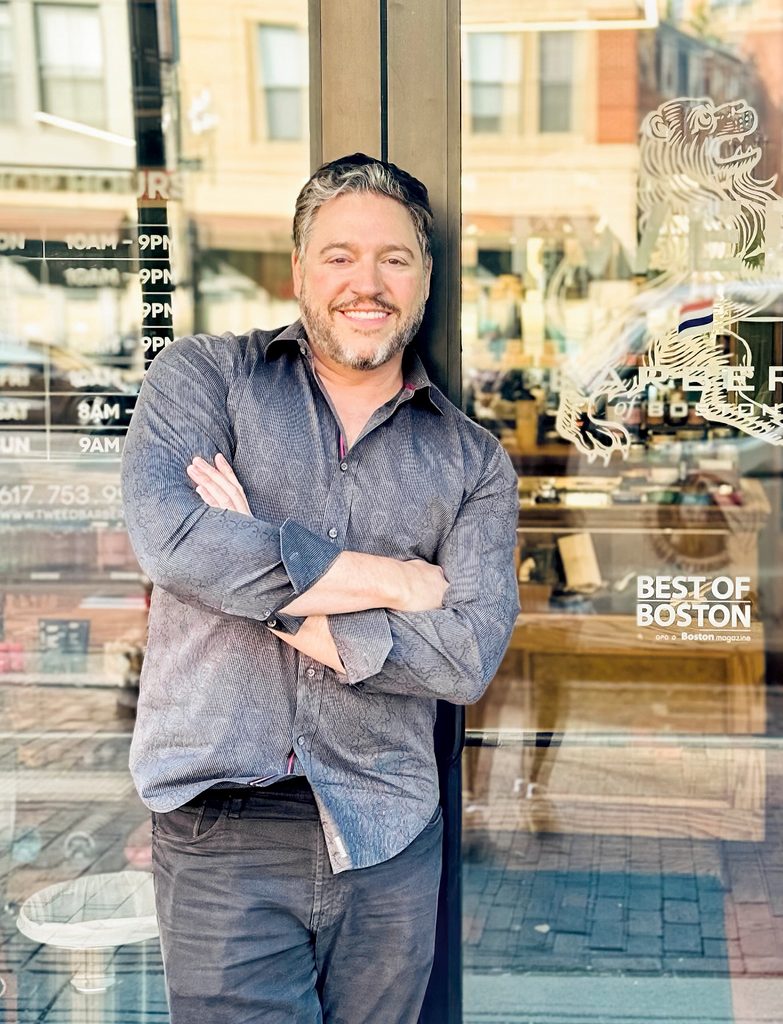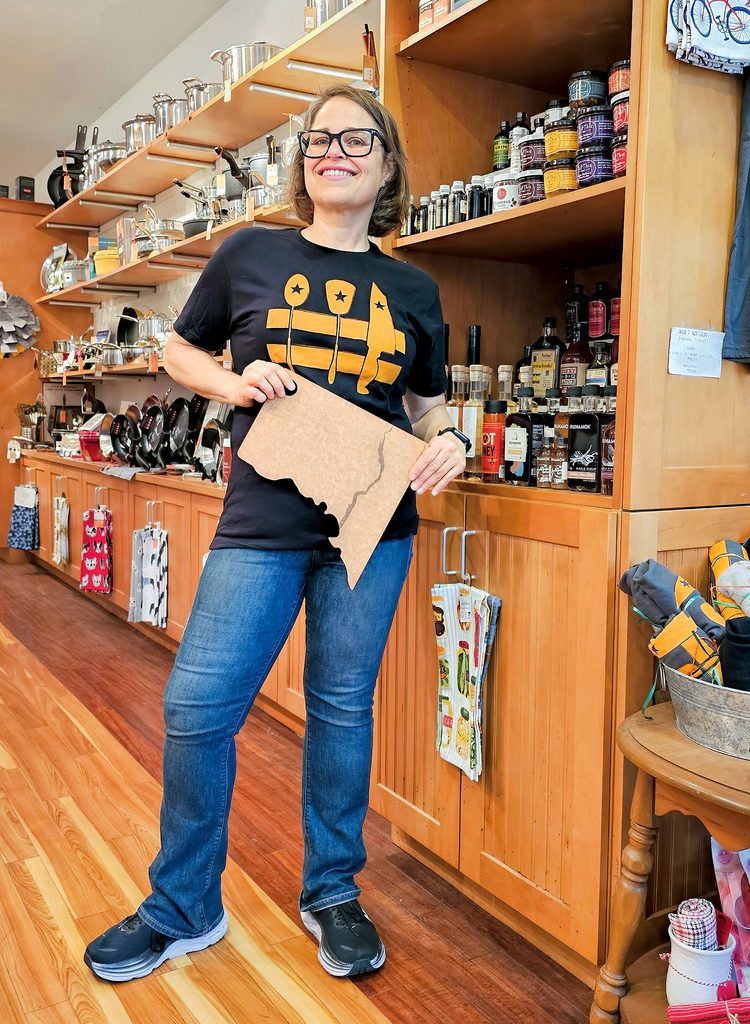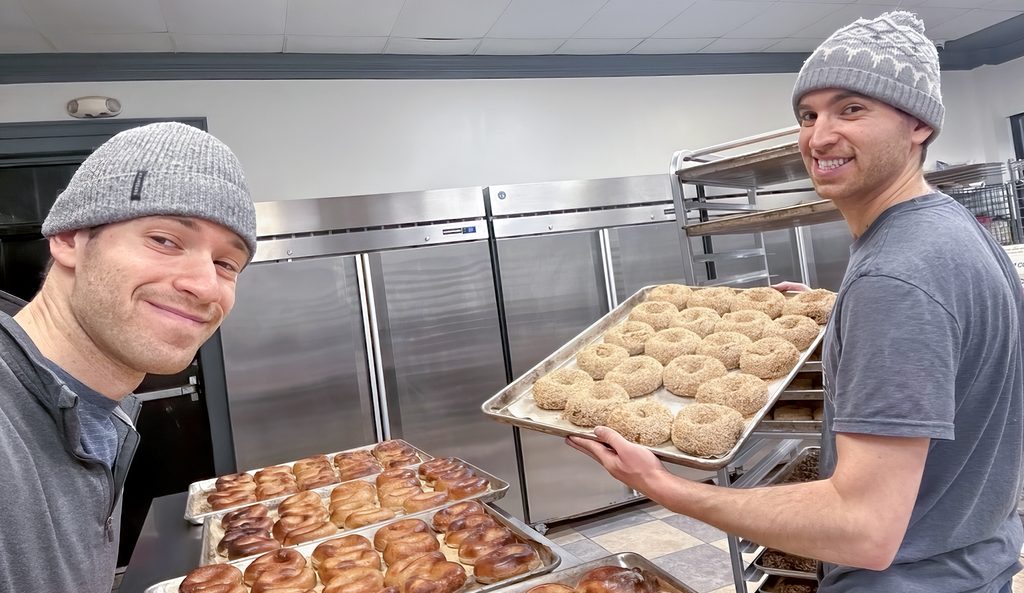Real Talk about Small Business Ownership
The thoughtfully curated line of spirits from Duluth’s Vikre Distillery is more than just alcohol. From a trio of signature gins (cedar, juniper, and spruce) to Lake Superior Vodka and Temperance River Straight Rye, the natural world is infused throughout to create a carefully crafted, hyper-local product.

“I didn’t just want to make gin,” says Emily Kuross Vikre ’05, who runs the micro-distillery with her husband, Joel. “I want to make a gin that tastes like the experience of stepping into a forest filled with evergreens with a little bit of sunlight filtering through or walking along the banks of the Temperance River in the spring as the snow melts.”
Vikre’s optics are impressive: the distillery recently turned 10, with sales jumping from around 3,000 to 12,000 cases of spirits annually and distribution in Minnesota, Wisconsin, Michigan, Nebraska, Iowa, and even the Pacific Northwest.
But in a 2023 blog post, Vikre and seven other women entrepreneurs dug into some “real talk about small business,” noting that “behind the cool entrepreneur façade, you’ll find exhausted-to-the-bone, occasionally zombie-like, small business owners buckling under the weight of their worlds”—many who are making very little, are deep in debt, yet remain committed to the communities they rely on.
The post offered a peek behind the shiny Instagram–lined curtain. When you spot that whimsical bottle of gin distilled with the purified water of Lake Superior and locally foraged botanicals at the liquor store or stop by the buzzing distillery for a crafted cocktail, it’s impossible to know how much love, care, frustration, energy, and even pain went into its making. Among many challenges, Vikre has navigated changing liquor laws, regulatory hurdles, financial growing pains, and the COVID-19 pandemic.
“You’ll never get to a place where you’ve solved your problems,” says Vikre, who has a doctoral degree in food policy and applied nutrition. “You only get different problems to solve. If you’re lucky: better problems to solve.”
She adds: “It’s about the people and the flavors—those have been constant motivations for me throughout my life. As long as it feels like having the distillery supports those things, both with the amazing people I get to work with and the people who come in and tell me stories about what their favorite drinks are . . . and then constantly discovering new flavors and ways to highlight flavors in cocktails—that keeps me going.”
According to the U.S. Bureau of Labor Statistics, on average, 18 percent of small businesses fail within their first year, 50 percent fail after five years, and only about one-third of businesses make it a decade. In this world, Vikre Distillery is a survivor.
Along with Vikre, many alumni have dedicated themselves to their small businesses while juggling dual realities. Their identity becomes intertwined with their work—the thrill of positive Google reviews can be erased by a single lousy one; a smiling face greeting you at the door could be hiding exhaustion from staying up all night dealing with plumbing issues, and a table of fresh baked goods disguises the reality of an employee who didn’t show up for their shift. But when it comes right down to it, the joys of business ownership outweigh the drudgery and stress. And customers and communities are better for it.
Cutting out the risk
Tweed Barbers has its fair share of well-known clients, from local politicians to celebrities like Jon Hamm and Tom Hanks. The high-end Boston shop has a loyal customer base and a roster of barbers who have been with Tweed for over a decade. When owner Peter Solomon ’93 first started in the business, he had four barbershops in Chicago before expanding to Boston. Tweed is now Solomon’s sole shop, which he’s been running for almost 20 years, with a name change in 2013.

“What resonated with me is that I was creating something where I was the target market,” says Solomon, who’s married to Gretchen Hall ’95. Their oldest daughter, Sadie, is a sophomore at Carleton. “Twenty years ago, there were not many high-end barber shops. If you wanted to get quality, you typically had to go to a salon where a lot of guys might feel emasculated because it was geared more towards women. The existing barbershops then tended to be more hole-in-the-wall places doing limited haircuts that weren’t particularly stylish. I wanted to fuse a salon’s quality and service levels with a more masculine atmosphere.”
Even though Solomon’s passion for the barbershop business hasn’t waned since he first started, his risk tolerance has diminished. In his early 30s, he felt a certain level of invincibility, but as he got older and had two children, he was reluctant to introduce additional risk into his business by taking on multiple stores. Instead, he puts his energy into Tweed by consistently investing in its employees and shop upgrades including new top-of-the-line barber chairs and custom lighting to enhance the barbershop experience for both his customers and barbers. Like so many small business owners, he sees his business as an extension of himself.
“I still get sick to my stomach every time I see a negative review,” says Solomon, who also recalls a sewage issue he faced at the shop that likewise turned his stomach. “I reach out directly to see if we can do something to improve the situation. A review like that would have ruined my day when I was younger. I’m a little better at dealing with it now, but it still bothers me almost as much.”
Solomon is committed to giving his customers a satisfying experience and his employees a professional working environment. He takes tremendous pride in seeing several of Tweed’s barbers achieve a certain level of financial success.
“When the shop is lively and full, that’s when I’m at my happiest, at least from a professional perspective,” he says. “When all the chairs are filled, when all the barbers are happy, productive, and active and clients are enjoying themselves, that’s the actualization of my vision when I started this.”
When rediscovery means walking away
Leah Daniels ’02 opened Hill’s Kitchen in 2008, just a few blocks from her childhood home in Washington, D.C.’s Capitol Hill neighborhood. During its 17-year run, the independent gourmet kitchenware store has become an “unbelievable success,” says Daniels, as both a business and a staple of the community.

“It’s where people get their Christmas gifts,” says Daniels. “It’s where their kids first felt safe walking down the street with a $20 bill to buy a gift for mom. The store has been part of people’s lives in only the best ways.”
Daniels has devoted all her energy and heart to Hill’s Kitchen 24/7 since her 20s. That dedication no doubt drove its success, but it’s also what’s starting to tear her down.
Last summer, she experimented with “summer hours” for the first time, closing three days a week from the middle of July through August. After relaxing and enjoying time with friends, she realized it was time to “jump off the hamster wheel.” There were baseball games to see, new places to travel to, dates to go on, music and books to explore, relationships to develop, cooking to do—all things she loves but has lacked in her life because of her unwavering commitment to Hill’s Kitchen. Recently, Daniels made the bittersweet decision to prepare an exit plan.
“I love my business; being a small business owner is the greatest thing ever,” she says. “It also eats you alive and you lose yourself. I want to know who Leah Daniels is. It’s going to take some time to figure that out. That’s why I must walk away totally.”
Daniels says she’ll miss Hill’s Kitchen but looks forward to the future. And, who knows, there might be another business idea in the cards.
Fresh entrepreneurial dreams
Would you believe that Northfield inspired a New York bagel company? It’s true. Sort of.
“It was a motivating factor,” says Josh Small ’20, who runs DoughCo Bagels with his brother, Jacob Small ’22.

While traveling the Midwest as part of Carleton’s baseball team, Josh noticed a lack of food options for college students in the small towns they encountered. That’s when the idea for a bagel shop emerged. So, he started tinkering with bagel recipes until he created the one that inspired DoughCo. After returning home after graduation, Josh reached out to farmers markets. He got some bites and enlisted family and friends to help him make and sell bagels on the weekends. By the beginning of 2023, Josh had quit his job, with Jacob following suit a year later to work full-time on DoughCo.
While the dream of opening a bagel shop in Northfield, or any other small college town for that matter, hasn’t come to fruition yet, the Small brothers have carved out a bagel-sized niche selling their homemade creations at nearly 20 farmers markets and a number of coffee shops in New York. With Josh overseeing day-to-day operations while Jacob focuses on business plans for future opportunities, they’ve been churning out 4,000 bagels per week at an industrial kitchen they rent in Manhattan. Now, the brothers say they’ve found the perfect spot for DoughCo Bagels’ first brick-and-mortar storefront in Irvington, New York, near their hometown of Chappaqua.
“At our old jobs, a lot of things started to be repetitive and mundane,” says Jacob. “Starting and running a business, you must figure things out daily. Josh and I are learning this together and it’s been a lot of fun. We’ve never built a business before, so learning everything has been great.”
The brothers appreciate their relationships with customers and other small businesses at farmers markets. While they consistently get good feedback about the quality of their bagels, they’ve also run up against serious pain points, including scaling production and securing employees who will show up in the wee hours of the morning to make fresh bagels.
“We wouldn’t be doing it if the good didn’t outweigh the bad,” says Josh. “Jake and I have spoken about the future of the business. If we ever decide to walk away from it, we’d be strong MBA candidates because we grew our own business from zero to making close to $200,000 every year in sales. That doesn’t sound like much, but we’ve come a long way compared to what we did two years ago.”
Community support
For Vikre, Daniels, Solomon, and the Small brothers, keeping their shops alive depends heavily on community support. Loyal customers spread the word about their booze, kitchen gadgets, haircuts, and bagels. While it might not be as convenient as ordering online or going to chain outlets, spending money at small businesses not only benefits the owners, but it also trickles down to employees, the local business community, distributors, and a host of other folks behind the scenes.
This connection with community has been an ingredient at Vikre since the distillery’s founding. Asked how she feels when witnessing a full house at Vikre with people having fun, conversing and sipping cocktails—a testament to the community she’s helped build—she doesn’t hesitate when answering.
“I feel more fired up than ever,” says Vikre, who admits to having a “ridiculous level of persistence” in regards to not giving up. “At the end of the day, we’re making spirits. We’re not doing anything that serious. At the same time, there is real motivation and real meaning to being an entity that brings people together.”
Amy Carlson Gustafson is a Twin Cities–based freelance writer and former St. Paul Pioneer Press reporter
